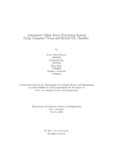| dc.contributor.advisor | Hossain, Muhammad Iqbal | |
| dc.contributor.advisor | Sakeef, Nazmus | |
| dc.contributor.author | Hossain, Zarin Tahia | |
| dc.contributor.author | Roy, Protyasha | |
| dc.contributor.author | Nasir, Rina | |
| dc.contributor.author | Nawsheen, Sumaiya | |
| dc.date.accessioned | 2022-02-06T05:16:36Z | |
| dc.date.available | 2022-02-06T05:16:36Z | |
| dc.date.copyright | 2021 | |
| dc.date.issued | 2021-10 | |
| dc.identifier.other | ID 18101184 | |
| dc.identifier.other | ID 18101116 | |
| dc.identifier.other | ID 17201008 | |
| dc.identifier.other | ID 17201001 | |
| dc.identifier.uri | http://hdl.handle.net/10361/16099 | |
| dc.description | This thesis is submitted in partial fulfillment of the requirements for the degree of Bachelor of Science in Computer Science and Engineering, 2021. | en_US |
| dc.description | Cataloged from PDF version of thesis. | |
| dc.description | Includes bibliographical references (pages 32-34). | |
| dc.description.abstract | The term online proctoring comes hand in hand with online education. There are
not many exceptions between traditional education and the online education system
except for the fact that online education, as well as online examination, happens
over the internet. Due to the Covid-19 situation, when going to schools or colleges
and receiving an education is not possible, online education is helping the students
to continue their education properly. As much as the importance and necessity of
online education can be seen, questions regarding the validity of online exams also
emerged. In traditional pen-paper examinations, it is quite di cult for students to
cheat under the watchful eyes of the examiner. However, in online examination,
the scenario is quite di erent as there is an absence of an invigilator and thus it
is quite di cult to observe examinees and detect cheating attempts during online
exams. Even though there are already many systems for online proctoring, not
all educational institutes can a ord them as the systems are very expensive. In
this paper, we have used eye gaze and head pose estimation, along with that voice
detection as the main features to design our online proctoring system. Therefore,
the purpose of this paper is to use these features to create an online proctoring
system using computer vision and machine learning and stop cheating attempts in
exams. | en_US |
| dc.description.statementofresponsibility | Zarin Tahia Hossain | |
| dc.description.statementofresponsibility | Protyasha Roy | |
| dc.description.statementofresponsibility | Rina Nasir | |
| dc.description.statementofresponsibility | Sumaiya Nawsheen | |
| dc.format.extent | 34 pages | |
| dc.language.iso | en | en_US |
| dc.publisher | Brac University | en_US |
| dc.rights | Brac University theses are protected by copyright. They may be viewed from this source for any purpose, but reproduction or distribution in any format is prohibited without written permission. | |
| dc.subject | Online proctoring | en_US |
| dc.subject | MFCC | en_US |
| dc.subject | XGBoost | en_US |
| dc.subject | MLP | en_US |
| dc.subject | Hybrid classifi er | en_US |
| dc.subject | Cheating prediction | en_US |
| dc.subject.lcsh | Machine learning | |
| dc.subject.lcsh | Internet in education | |
| dc.subject.lcsh | Computer-assisted instruction. | |
| dc.title | Automated online exam proctoring system using computer vision and hybrid ML classi er | en_US |
| dc.type | Thesis | en_US |
| dc.contributor.department | Department of Computer Science and Engineering, Brac University | |
| dc.description.degree | B. Computer Science | |

